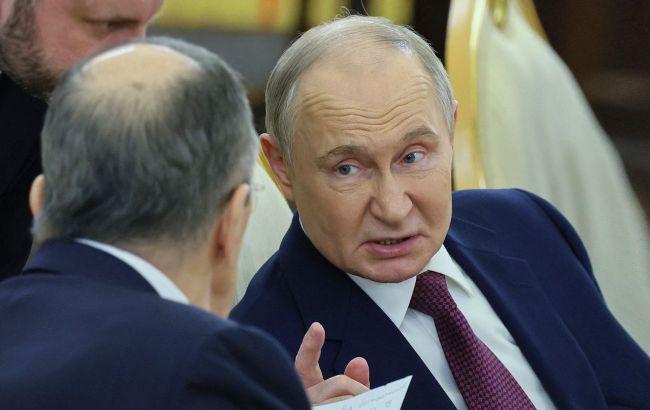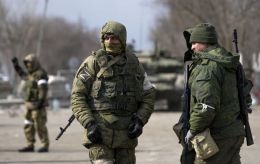US and EU tighten sanctions: What Russia will face if Putin refuses truce
 Putin faces devastating sanctions from the US and EU (photo: Getty Images)
Putin faces devastating sanctions from the US and EU (photo: Getty Images)
The European Union and the United States have announced new sanctions against Russia if it rejects peace initiatives proposed by Ukraine and its partners. Washington stated that the sanctions would be bone-crushing for Moscow.
RBC-Ukraine's material explains what threatens Russia.
Takeaways
-
What will be included in the EU and US sanctions packages?
-
Why is the Lindsey Graham bill effective?
-
Three types of US restrictions – what are they?
-
Why could EU sanctions be weaker than those of the US?
Ukraine is actively preparing for a meeting with Vladimir Putin on May 15 in Türkiye. Volodymyr Zelenskyy has confirmed several times that he is ready to speak with the Russian President about ending the war this Thursday in Istanbul or any other Turkish city.
So far, Putin has neither confirmed nor explicitly refused such a meeting. His spokesperson, Dmitry Peskov, has also avoided a clear answer, only stating that "the language of ultimatums is unacceptable for Russia."
If the meeting in Istanbul brings no results and there is no ceasefire, Russia will face new sanctions from the US and the EU. Both Washington and Brussels have confirmed the preparation of new sanction packages.
"If Russia refuses an unconditional and complete ceasefire, sanctions must be imposed – tougher sanctions against its energy sector and banking system," Zelenskyy stated. He emphasized that these must be the strongest sanctions yet.
Sanctions are likely, but questions remain
Full details about the upcoming sanctions are not yet available to the public. What is known is that both the American and European sides have been preparing them in advance. According to the Office of the President of Ukraine, the sanctions will be very tough.
"I know the details of a new sanctions package that could be implemented. It's very tough, and if enacted, it could be coordinated with similar packages from Europe, the UK, Canada, etc., and it will really hurt. The Russian economy is not in a state to endure even more sanctions. New sanctions will amplify all existing effects," said Andriy Yermak, head of the Office of the President, in an interview with RBC-Ukraine.

Head of the Office of the President, Andriy Yermak (photo: Vitalii Nosach, RBC-Ukraine)
He noted that the main US sanctions are outlined in a bill proposed by Senator Lindsey Graham. The EU sanctions will also be tied to this legislation. "These sanctions will be applied immediately once it becomes absolutely clear that Russia has definitively rejected any proposals for a ceasefire," Yermak said.
So far, Western allies' sanctions policy has been implemented rather slowly. Its primary goal — to weaken Russia’s ability to sustain its war effort — has not yet been fully achieved.
This time, however, Ukraine’s partners promise that the blow to Russia’s economy will be devastating. At least, that’s what the author of the US bill has stated. Earlier, Senator Graham said that if Russia rejects the ceasefire, it should face a "sanctions hell."
EU sanctions are unlikely to be 'devastating'
The Graham bill, according to Bloomberg, includes secondary tariffs on oil. This means Washington will impose a 500% tariff on imports from countries that buy Russian oil, petroleum products, natural gas, or uranium. Additionally, US citizens are planned to be prohibited from purchasing Russian government bonds. The sanctions could also target Gazprom, as well as major companies operating in the natural resources and banking sectors, Reuters reported.
It remains unclear how powerful the EU sanctions will be and how closely they will align with the US package. Currently, the EU is preparing its 17th sanctions package.
However, according to unofficial information, the new sanctions package includes restrictions on more than 100 ships (possibly up to 200, according to some versions) of Russia’s shadow fleet, as well as sanctions against over 50 individuals and entities.
The restrictions will target 31 companies supporting the Russian military-industrial complex or involved in circumventing sanctions. Plans are also underway to strengthen export controls on products and technologies that could be used by the Russian military.

President of the European Commission, Ursula von der Leyen (photo: Getty Images)
According to a source interviewed by RBC-Ukraine, who is directly involved in sanctions matters, calling the sanctions in the 17th package "devastating" would be a significant exaggeration. "In principle, the sanctions are not bad, but they are not as strong as they could be," the source commented.
Skepticism about the effectiveness of these sanctions was also expressed by the head of the parliamentary committee on freedom of speech, Yaroslav Yurchyshyn. "Well, it's kind of 'powerful power.' Somehow, I don't believe that after this, Russia will feel the pain of this war," he said.
At the same time, Yurchyshyn pointed out that the EU has not yet fully implemented sanctions on Russia's energy sector — there is no ban on importing Russian gas, not all banks have been disconnected from international payment systems, and there are not enough restrictions on technology and software.
However, even the introduction of sanctions included in the new package cannot be guaranteed yet. Their adoption in the EU is complicated by Hungary's position, which is opposed to such a step. But the EU is preparing tools to bypass Hungary's potential veto.
The adoption of the 17th sanctions package by the EU Council could take place as early as May 20. On May 14, EU ambassadors agreed on the contents of the sanctions package. The restrictions in it may be strengthened if the negotiations in Istanbul do not yield the expected results.
Main sanctions strike on Russia could come from the US
The primary impact on Russia could come from new American restrictions, believes former Ukrainian presidential advisor and economist Oleg Ustenko. He is confident that these sanctions will undoubtedly be imposed. "Right now, the US has no other option. If Russia doesn't sit down at the negotiation table and Trump feels that Putin 'is tapping him along,' he will have to take action. He can't just leave this situation as it is," Ustenko stated in a comment to RBC-Ukraine.
He believes that the US has three main options for increasing sanctions pressure on Russia.

US President Donald Trump (photo: Getty Images)
The first option is Senator Graham's proposal to impose a 500% tariff on countries that buy Russian oil. These tariffs would primarily hit China, Türkiye, and India. However, these three countries are unlikely to object and will most likely abandon Russian oil.
"China is unlikely to spoil its relationship with the US now after they reached a trade conflict resolution. It is now easier for Beijing to give up Russian oil than to engage in a new confrontation with Washington. I believe the Chinese will agree (to stop buying Russian oil - ed.)," Ustenko believes.
He also estimates that Türkiye will probably agree to abandon Russian oil, as it is negotiating with the US on trade issues following Trump's decision to impose tariffs. "The Turks are likely to agree (to stop buying Russian oil - ed.) since they will gain some additional benefits in terms of a trade deal with the US," Ustenko noted.
India, in his opinion, will also not oppose abandoning Russian oil under the current conditions of the conflict with Pakistan. "In this conflict, it is not particularly beneficial for India to lose US support," emphasized Ustenko.
Ustenko believes that Graham's law could be implemented quite quickly, and it would have a significant impact on Russia. "Russia receives about $150 billion a year from oil sales. Perhaps some smaller countries will continue to buy it, but if China, Türkiye, and India refuse, Russia could lose that $150 billion. That’s nearly 40% of its military budget. Moscow will then have to either cut its military budget, which is unlikely or reduce non-military expenses, which is less realistic in the current situation," Ustenko concluded.
The second option is that the US could impose a 25-50% tax on Russian oil. This tax would have to be paid by anyone purchasing Russian oil, or secondary sanctions would be applied to them, Ustenko noted.
This tax would go into a special fund, which would then be used to support Ukraine. "So, those who buy Russian oil will continue to buy it, but the tax will go into the fund. In this case, the Russians will receive less money. For example, not $60 per barrel, but $45 in the best-case scenario for them," the economist explained.
"Trump would gain an advantage in this case. He could force the Russians to the negotiation table and raise $45 billion a year for the fund. This way, he could justify why the US continues to support Ukraine – because the US would simply have the money they collected from the Russians," Ustenko stated.
The third option is a combination of the first and second. That is, if secondary sanctions do not fully work, additional special tariffs on Russian oil may be introduced.
Regarding EU sanctions, Ustenko believes they are more symbolic than effective. "I think they (EU sanctions – ed.) should show that the EU is consistent in its actions and ready to continue applying sanctions pressure on Russia," said the former presidential advisor. He is confident that the most effective measures could be additional restrictions on the purchase of Russian LNG in the EU, but so far, the EU has not implemented them, although they are preparing to abandon this import by 2027.
After the 17th package of sanctions, which the EU plans to adopt in the coming days, Brussels is already preparing for the next wave of sanctions. According to Ukraine’s Commissioner for Sanctions Policy, Vladyslav Vlasiuk, preparations for the main sanctions package, which could respond to Russia's refusal to engage in peace initiatives with Ukraine and its partners, may begin in the EU as early as next week.

